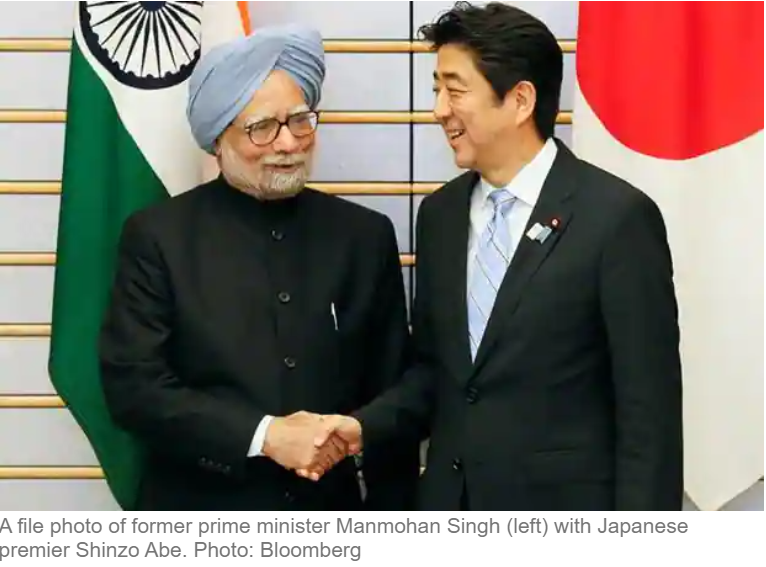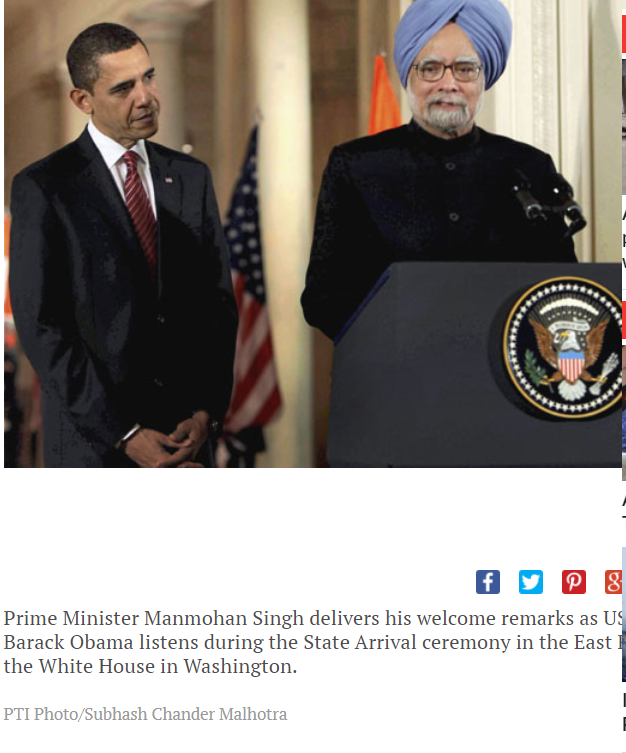Author: Amandeep Singh
Independent Researcher
Although there is hardly any media attention on the role of ex-PM Dr. Manmohan Singh at this critical contemporary moment, he continues to provide us with exemplary lessons to follow. Firstly, as the Covid-19 crisis continues in India, Dr. Singh has been dedicated to continually making visionary administrative decisions that, unfortunately, finds no space in the ‘oppositional’ form of today’s governance. For example, his recent letter to the current PM of India expressed his humanitarian concerns and sense of empathy towards human suffering. Another lesson is, in Dr. Singh’s own words, “history is kinder to him than the media”. Taking these factors into account, this article is an attempt to highlight the socio-economic contributions made by Dr. Singh, even as he personally struggles with an infection of Covid-19.

It is striking to note that the leader who should be credited for pulling out 140 million people from poverty, who brought about telecom revolution in the country, who empowered the people with the Right to Information (RTI) in an effort to curb corruption, who initiated the UID-Aadhar card program make sure all received government assistance, who conceived and implemented NAREGA to ensure economic security for the unemployed, who respected the sovereignty of India’s institutional framework (in fact, up-holding its integrity—even at the cost of his personal reputation), who pacified the political disturbances in the troubled state of Kashmir (allowing for its real integration with the nation), who instituted measures to deflect the onslaught of a global economic recession, and who lead India into a nuclear deal with the USA, would—despite all these contributions—be awarded negligible personal or political credit in India’s history.
So, who or what failed this unique leader with an almost unparalleled progressive track record in modern world history? This is an important question that has continued to elude us in today’s politics.
An important aspect current politics is that it conjures up the public psychology, which is then manipulated and controlled through the construction of collective desires. Drawing upon Slavoj Zizek’s reference to the Lacanian concept, ‘Objet petit a’, which signifies an ‘unattainable cause of desire’, I want to highlight the modular form of politics that relishes in extra or surplus enjoyment—greater than the actual value of political ideology. Our understanding of Objet petit a becomes further illuminated when we note a parallel relationship between pleasure derived from a fantasy and an actual reality. The delusion of a good fantasy imparts a lens through which the essence of reality is reproduced via a ‘zoom-in’ effect. For example, a movie is good not only because of its entertainment value, but also because it renders a sense of association with its audience, coaxing out deeper desires with a close, personalized effect. The viewer becomes enchanted as the movie (fiction) gets internalized through the viewer’s image perception, drawing indirect pleasure even though deep-down they are aware those personal desires may remain unattainable in real life.
Public perception both in movies and politics is often manipulated by employing techniques of human psychology such as these. Political ideology promotes the internalization of fantasy by educating citizens ‘how to desire’.
Bringing this discussion back to Dr. Manmohan Singh, it can be said that he failed to take note of these psychological techniques that groom public perceptions. Throughout his career, rather than engineering some false narrative of utopian ideals or constructing a charismatic cult of personality around his image, he consistently stayed true to his humble, natural self. He avoided advertising his personal life or of his humble origins to gain political capital, abstained from using personal remarks against his opponents, never pulled off any public stunts for entertainment, and restrained from taking any glamourous measures to promote his public image. Consciously or unconsciously, he recognized that creating an attractive, larger-than-life charismatic personality blurs the line between a natural self (free from any image distortion) and an artificial self (enslaved by dazzling attractions). Therefore, he was naturally transparent in his public appearances and remained devoted to public service.
Dr. Manmohan Singh, perhaps, understood that to truly empower a nation, it was central that its citizens live in a liberal, free-thinking environment, not one enslaved by any psychological seizures conjured by artificial glamour. Being educated at Oxford, Dr. Singh’s views were in line with Immanuel Kant’s views on enlightenment that states, “Enlightenment is man’s release from his self-incurred tutelage”. As such, in his routine engagements, he was deeply devoted to matters of public administration. Unlike a regular politician, he did not focus much on fostering his oratory skills to deliver great speeches. On the contrary, his public life by and large remained devoted to ‘walking the walk’ instead of just zealously ‘talking the talk’.

Drawing on Sikh piety, Dr. Singh helped to combat India’s feudal and racial way of relating citizens—a way that uses power to selfishly advance an individual’s self-assertive ego or the ego of the collective nation. Because he did not aspire for power, he was perhaps rightly characterized as ‘An Accidental Prime-Minister’. His demeanor teaches us that the power of the modern state should remain impersonal and bound to self-accountability. Unfortunately, this aspect of his personality has been grossly overlooked within public and political domains. During Dr. Singh’s time in office, the leaders and workers of the Congress Party, his party, bypassed their Commander-in-Chief by establishing a parallel internal structure of power to actively assert their own personal egos. Those opposed to the PM were impatient to seize power and therefore falsely targeted his personal image by calling him an inauthentic leader of the nation and charging him with corruption.
Nevertheless, even if Dr. Singh’s due credit as such an important leader was denied within the nation he served, it was finally brought to light at the international stage by former American president Barack Obama last year. Mr. Obama would remark in his book, A Promised Land, “For the duration of his tenure as prime minister, I would find Singh to be wise, thoughtful, and scrupulously honest… As a chief architect of India’s economic transformation, Prime Minister Manmohan Singh seemed like a fitting emblem of this progress… a self-effacing technocrat who’d won people’s trust not by appealing to their passions but by bringing about higher living standards and maintaining a well-earned reputation for not being corrupt.”

Meanwhile in India though, political prejudices led to an active effort to paint a false image of Dr. Singh’s truly larger-than-life historical account. A biopic movie “An Accidental Prime Minister” was released five years after he left his office, slyly intended to harm the public’s image of Dr. Singh by projecting him as a politically weak leader. Similarly, the current PM of India has made personal attacks in the parliament against Dr. Singh in an effort to dent his credibility. His reputation was additionally under attack from political and religious platforms like that of the SGPC in Punjab and, at times, he was even openly criticized as a ‘non-Sikh’ (or at least as someone who did nothing for Sikhs during election rallies). Perhaps the biases of religion (propagated through Hindutva’s ideology) and caste (his non-Jat descent), offer some explanation to this unusual political slander of his public image.
Dr. Singh’s political philosophy and practice inadvertently produced a demand for what the guiding principles of public service and the idea of ‘welfare state’ really should be in our contemporary moment. The normal cacophony of routine politics has neglected completely to discuss the role of his economic reforms beyond simply being a part of the routine, historical logic of capitalism. Such ignorance stems not only from the political biases against him, but from the conceptual distortions within the field of epistemological inquiry, which relies heavily on the Western modes of conceptual constructions. The influence of Western epistemology is instrumental in the form of what Judith Butler mentions in a different context as “spectral figures whose semantic implications undermine the explicit claims of disembodiment made within language itself”. Knowledge construction that calls for ‘spectral impediment of language and its implied concepts’ is based on a very peculiar reading of culture, history, and religion upon which a world view is constructed and/or subverted. Let me contextualize this in Dr. Manmohan Singh’s style of creative leadership.

By rediscovering the limits imposed by the foreclosure of native language and concepts via secular forms of language and symbolic constructions, it can be noted that the historical foundation of Dr. Singh’s administration stems from his devotion to public service—traditionally termed as Seva. Unfortunately, the term Seva—linguistically a cultural and religious phrase—has not been examined appropriately in a strictly secular, academic domain. Dr. Singh’s administration re-discovered this heritage of India and sutured it with the seat of political power. His leadership rendered the possibility of a philosophical encounter between routine understandings of secularism, nationalism, and traditional Indian ethos. Such encounters undergird the potent possibilities to reimagine the modern secular nation as a fluid, universal entity that—when bound with the power of Seva—may push against its historically and ethnically determinate form. It also dismantled the political understanding of nation derived from identity politics and the racial structuring of human ethnicity which covertly demarcated a ‘Self-Other’ binary in the common imagination.
Incidentally, the academic discourses of our age have also failed to recognize the idea that the modern welfare state discursively evolves into the concept of Seva. Such limited discourses have closed out the opportunities and continuous possibilities to access the latent potential universality of Seva. In neglecting the true spirit of Seva in academic research these academics have reinforced a European understanding of secularism and a racial sense of nationalism that, by acting as an absolute idea, overshadows the Indian imagination. Such domestication disavows discussions of traditional, spiritual concepts in favor of a so-called truly ‘liberal-secular’ discourse. It inhibits the manifestation of intrinsic value of spiritual concepts in the political sphere, making these concepts vulnerable to complete misuse in hollow, political sloganeering. In conclusion, the historical contributions of Dr. Singh have been ignored amidst the chaotic power struggles of our times. Upon a closer look, it can be noted that his contributions have re-grounded the basic pillars of modern polity into key Indian traditions and have kneaded political philosophy with an Indian essence. Dr. Manmohan Singh redefined secularism and nationalism—and excavated for them each a fresh meaning—without creating any binary with an imagined ‘Other’. He weaved his sanctimonious ethos into the spiritually secular fabric of India. This was an important, conceptual gift that the author of the economic revolution gave to India—all without taking any personal credit. Regrettably, there is still no attention given to how his economics were embedded in social equality and political philosophy. It is a rigorous philosophical process to discuss the factors that impede the valuable virtue of Seva—culminated in the Sikh doctrines—to become practicable in a political domain. History is yet to perceive the potential of such meta-historical values that underlie this ahistorical figure’s ethical height, comparable with the greatest of human history including Martin Luther King Jr., Mother Teresa, and Abraham Lincoln. Dr. Manmohan Singh, ‘took a little more than his share of the blame, a little less than his share of the credit.’
